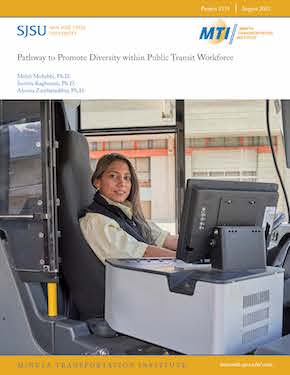- 408-924-7560
- mineta-institute@sjsu.edu
- Donate
Pathway to Promote Diversity within Public Transit Workforce
There are many aspects of the transportation industry that can be focused on, but the lack of resiliency is one of the most urgent. Enhancing resiliency and creative problem-solving is essential to the industry’s growth and survival. But it cannot happen without building a more diverse workforce. Women still make up a small fraction of transportation workers, and African American and Hispanic employees are even less represented. These disparities are increasingly pronounced in many senior positions, particularly in STEM fields. Meanwhile, the public transportation industry is experiencing a severe and worsening workforce shortage and many agencies have reported substantial difficulty recruiting, retaining, and developing skilled workers. Considering the transit industry’s existing diversity and inclusion toolkits and guidelines, this project emphasizes lessons from in-depth interviews with leaders from 18 transit agencies across the country. The interviews illuminate the existing challenges and creative solutions around transit workforce diversity and inclusion. From the interviews, we discovered: 1) the critical factors that impact the current level of diversity and career mobility within transit agencies; 2) how diversity efforts help explore resources and provide opportunities for effective and robust employee engagement; and 3) the significance of evaluation systems in creating a more transparent recruitment process that initiates structural shifts, resulting in better recruiting. Moving towards inclusive and equitable workforce environments is a healing process that starts with understanding these gaps. We call this effort Healing the Workforce through Diversification.
MEHRI MOHEBBI, PHD
Dr. Mohebbi is the director of the Transportation Equity Program at the University of Florida Transportation Institute (UFTI). She received her Ph.D. from the University of Cincinnati in Urban and Regional Planning. She has more than 15 years of experience addressing equity and inclusion in transportation policy and practices. Her work focuses on promoting an inclusive workforce and developing effective community engagement methods toward equitable transportation decision-making. She is interested in the equitable engagement of diverse (and sometimes contradictory) ideas to enhance people's sense of attachment to their community and promote accountability for key players in transportation policymaking and planning. Since 2006, she has been involved in international professional organizations (such as American Planning Association) in different capacities. Presently, she serves on Transportation Research Board (TRB) International Coordinating Council, TRB Committee on Women and Gender in Transportation, and TRB Committee on Accessible Transportation and Mobility.
SUMITA RAGHURAM, PHD
Dr. Raghuram is the Endowed Professor of Human Resource Management at San Jose State University, USA. She received her Ph.D. from University of Minnesota in Human Resource Management. In her early career she was a faculty member at Fordham University, New York and at Pennsylvania State University, Pennsylvania. She is a pioneer in studying remote work and hybrid work and has been researching this area for past 30 years. In addition, she examines international human resource management and careers of tech workers. Topics such as employee identity, diversity, employee turnover and engagement, well-being and impact of tech work on human resource management are of particular interest to her. She has had a high impact in the field of management and has published her research in the top-tier journals. Sumita has also been a visiting faculty at international business schools such as Copenhagen Business School, Bologna Business School, and Indian School of Business.
AHOURA ZANDIATASHBAR, PHD
Dr. Zandiatashbar is an Assistant Professor of Urban and Regional Planning and co-director/co-founder of Spatial Analysis and Visualization institute (SAVi) at San José State University (SJSU). He has a rich experience in application of geospatial analytics and statistical modeling and mapping. His research activities have resulted in multiple publications in top ranked journals, two national awards and more than 20 presentations and talks. Prior to joining SJSU, Dr. Zandiatashbar was a key member in developing Illinois Map the Count 2020, Illinois COVID-19 Vulnerability, and Chicago’s Tap Water web-maps through the Urban Data Visualization Lab at the University of Illinois at Chicago. Dr. Zandiatashbar received his doctoral degree from University of Texas Arlington in Urban Planning and Public Policy with a focus on transportation planning and built environment, where he was also an interdisciplinary urbanist researcher at the Institute of Urban Studies and Center for Transportation, Equity, Decisions and Dollars (CTEDD). He also has a Master’s in Architecture and Urbanism from Rensselaer Polytechnic Institute.
-
Contact Us
San José State University One Washington Square, San Jose, CA 95192 Phone: 408-924-7560 Email: mineta-institute@sjsu.edu






